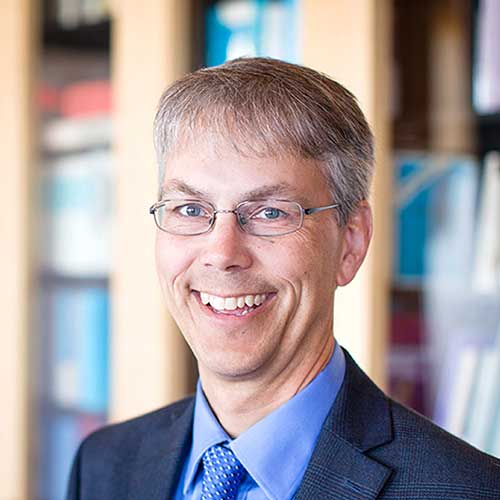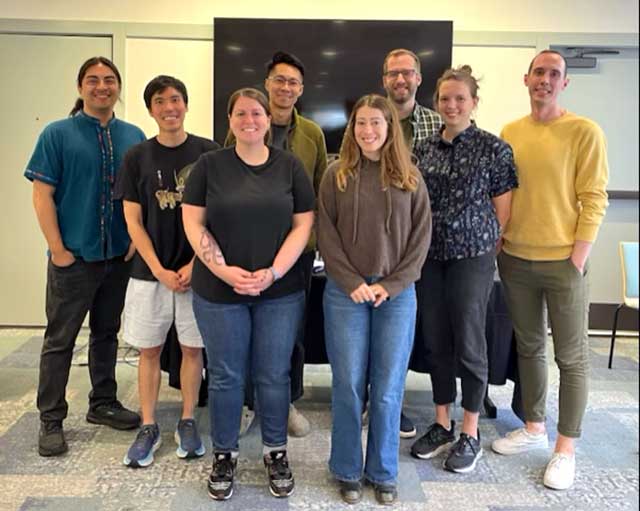
Winter 2024-2025 Newsletter
Two Former Fellows Win
Burroughs Wellcome Fund Career Awards


2022 Fellow Gloria Yiu, M.D., Ph.D., (pictured left) and 2021 Fellow Sydney Ramirez, M.D., Ph.D., (pictured right) both received Career Awards from the Burroughs Wellcome Fund. These awards support outstanding physician-scientists at the early stages of their careers, enabling them to bridge advanced postdoctoral or fellowship training and the early years of faculty service. The award provides $700,000 over five years to support the recipients’ research efforts and career development in the biomedical sciences.
Gloria, who is an Assistant Professor at UCLA, is a rheumatologist with scientific expertise in immunology. She conducted her postdoctoral research in Gay Crooks’s lab where she used a thymic organoid model to identify critical differences in the role of a key molecule – RORγt – in mouse versus human T cell development. These results could impact the feasibility of testing RORγt inhibitors in the clinic to fight inflammatory diseases.
Drawing on that background, Gloria continues to use thymic organoids to study a different molecule in T cell development. Her study supported by the Burroughs Wellcome Fund, Dynamic FOXP3 Expression in the Development of Regulatory T Cells from Induced Pluripotent Stem Cells, seeks to understand how the FOXP3 molecule drives the development of regulatory T cells, which could ameliorate autoimmune diseases by suppressing inflammation. The goal of her research is to gain insight into developing cell-based therapies for patients living with autoimmune conditions.
Sydney is an Instructor at the La Jolla Institute for Immunology (LJI), and an Infectious Diseases Specialist at the University of California San Diego (UCSD), who was a frontline healthcare provider caring for some of the first COVID-19 patients hospitalized in San Diego. Sydney first began studying coronaviruses, including the original SARS and MERS viruses, during her Ph.D. training. She conducted her postdoctoral research in Shane Crotty’s lab where she studied human immune memory to infections and vaccination, with an emphasis on understanding protective immunity to SARS-CoV-2, which causes COVID-19. Ramirez and her LJI colleagues have published a series of studies into the types of immune memory that are generated following SARS-CoV-2 infection and different COVID-19 vaccinations, how long immunity to SARS-CoV-2 lasts in the blood, and how well the immune system responds to newer SARS-CoV-2 variants.
Sydney’s more recent research has focused on immunity in the upper airway, including immune responses to respiratory infections and vaccines. Her research project funded by the Burroughs Wellcome Fund is entitled: Implications of upper airway adaptive immune memory in vaccine responsiveness and protection from respiratory pathogens. Insights from Sydney’s research may prove important in the development of next-generation vaccines that provide better protection against SARS-CoV-2 and other respiratory tract infections. You can read more about Sydney’s research here.
Scientific Committee Member Recognized by Cancer Research Institute

Scientific Advisory Committee Member Mark Anderson, M.D., Ph.D
Scientific Advisory Committee member Mark Anderson, MD., Ph.D., received the prestigious William B. Coley Award from the Cancer Research Institute on October 15, 2024. Mark is the Robert Friend and Michelle M. Friend Endowed Chair in Diabetes Research at the University of California, San Francisco School of Medicine and the Director of the Diabetes Center at UCSF.
Established in 1975, the William B. Coley Award for Distinguished Research in Basic and Tumor Immunology is given to one or more scientists for seminal discoveries in the field of basic immunology and cancer immunology. Mark and his collaborators, Christophe O. Benoist, M.D., Ph.D. (Morton Grove-Rasmussen Professor of Immunohematology at Harvard Medical School) and Diane J. Mathis, Ph.D. (Morton Grove-Rasmussen Chair of Immunohematology and Professor of Microbiology and Immunobiology at Harvard Medical School), were recognized for their foundational contributions to the understanding of immune tolerance mechanisms, self-antigen presentation, and the role of Aire in preventing autoimmunity. Their work, originally published in Science in 2002, is responsible for the field’s core understanding of these basic immunology mechanisms, which have formed the basis of immunotherapy research for the past several decades.
Current Fellows Participate in Leadership Retreat

Back row, Left to Right: Donovan Argueta, Ph.D.; Benjamin Wang, Ph.D.; Christopher Kuo, M.D.;
Nicholas Card, Ph.D.; Sydney Campbell, Ph.D. and Michael Ryan, Ph.D.
Front row, Left to Right: Jacqueline Giovanniello, Ph.D. and Lucy Bicks, Ph.D.
The A.P. Giannini Foundation seeks to prepare fellows to become the most respected investigators in their respective fields. In addition to funding research, the Foundation provides fellows with communications training and a leadership development program. A hallmark of the leadership program is an in-person retreat. Eight current fellows attended this year’s retreat, which was held over a weekend in October in Tiburon, CA. Facilitated by Mari Sciabica, who oversees the foundation’s leadership training, the retreat included interactive workshops on delivering feedback, effective coaching, and delegating as well as opportunities for the fellows to practice these skills with their peers.
Recent Fellows’ Virtual Gathering Explored Working in Industry
“If I had stayed in academia, then as a junior faculty member, I would have felt like a trainee again who has to work my way up.”
~2018 Fellow Amanda Janesick, Ph.D.,
Senior Scientist at 10x Genomics
Since 2018, the A.P. Giannini Foundation has offered its fellows leadership and communications training in addition to stipend support. As part of this programming, Executive Coach Mari Sciabica and Journalist-in-Residence Jerry Kay organize virtual alumni/fellow gatherings on topics that are relevant to researchers’ work across disciplines and sectors. These gatherings are designed to foster community between fellows and alumni, to explore leadership and communications concepts in real-world scenarios, and to build upon the leadership and communication skills that are explored during the APG fellowship program.
The most recent virtual alumni/fellow gathering featured three former APG Fellows who have successfully transitioned from academia to industry to share their experiences. Panelists included Brett Babin, Ph.D, who is a Principal Scientist in the Department of Biochemical and Cellular Pharmacology at Genentech where he supports small-molecule drug discovery specializing in chemical biology and mass spectrometry; Amanda Janesick, Ph.D., who is a Senior Scientist in the R&D Department of Applications at 10x Genomics; and Johanna Schaub, Ph.D., who is a Principal Scientist in Translational Sciences at Pliant Therapeutics where she supports multiple disease indications including leading research for the liver fibrosis programs.
The session was moderated by Mark Chao, M.D., Ph.D., a current board member of the A.P. Giannini Foundation and former A.P. Giannini Fellow who also successfully transitioned to industry. Mark currently serves as Chief Medical Officer of Scorpion Therapeutics and previously co-founded two biotech companies: TenSixteen Bio and Forty Seven, Inc.
During the one-hour session, the panelists discussed how they went about landing a job in private industry; some of the advantages of working in the private sector, including a better work-life balance; opportunities for different roles, including project management, that draw on the skills of a trained researcher; and some of the “pleasant surprises” that they found to be true at their jobs. As an example of the latter, two of the panelists said they continue to publish their research and speak at academic conferences. In addition, Amanda shared that when she started working at 10x Genomics, she was treated as a working professional from the beginning. “If I had stayed in academia, then as a junior faculty member, I would have felt like a trainee again who has to work my way up.” For those who joined the call, the session offered insight into some of the positive aspects of pursuing job opportunities outside of academia. Learn about future virtual gatherings of fellows and alumni in upcoming newsletters.